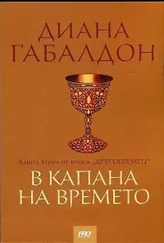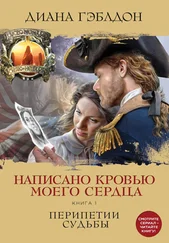“But he’s so tall. How could they—”
“It’s a little early to be calling Cyrus anything like that, I think,” I said firmly. “They’re friends, that’s all. Here, give me a hand with these trays of fried fish; they’re to go down to the big table under the spruce tree.”
I helped them out to the porch, then stood for a bit, looking over the festivities. Silvia and Bobby sat in chairs beside each other under the big white oak, and I saw Fanny leading Cyrus down through the multitudes to talk to them. It was too early for people to be drunk, but a number of them would be in another hour or two. People were eating at trestle tables and on the grass, on the porch and the steps, and the delectable smells of roast pork and cinnamon cake, laced with whisky fumes, perfumed the air.
My stomach rumbled suddenly, and Jamie, who had come out of the house behind me, laughed.
“Have ye no eaten anything at all yet, Sassenach?”
“Well … no. I was busy.”
“Well, now ye’re not,” he said firmly, and handed me the plate of buttered corn, fresh roast pork, and yams with chestnuts he was holding. “Sit down and eat, a nighean. Ye’re run off your feet.”
“Well, but there’s still—” I swallowed a mouthful of saliva. “Well, maybe—”
He took my elbow and led me to my rocking chair, this temporarily empty. I sat, suddenly grateful for the throb of relief that shot up from my ankles to the back of my neck. Jamie put the plate on my lap and thrust a fork into my hand.
“Ye’re no going anywhere, Sassenach, until ye’ve eaten that, so dinna be telling me otherwise. Jem! Bring your grannie some nut bread and some of the peach cobbler—wi’ a good bit o’ cream on it.”
“I—that’s—well … if you insist …” I smiled up at him, forked up a bite of honeyed yams, and closed my eyes, giving myself up to ecstasy.
I opened them, hearing a slight change in the rumble and chatter of the crowd.
Had the rest of the Crombies come after all? But no—it was a rider on a gray horse, a single tall man in a tricorne and a dark greatcoat that flapped like wings as he rode, coming up the wagon road and doing so at the gallop.
“If that’s effing Benjamin Cleveland …” I began, getting my feet under me. Jamie stopped me with a hand on my shoulder.
“No, it’s not.” Something in his voice brought me slowly to my feet. I set my plate down beneath the rocking chair and moved next to Jamie. He was steady enough, but his right hand was folded hard round the head of his stick, the knuckles white.
People were turning to look at the rider, distracted from their conversations. Jamie stood stock-still, his face unreadable.
Then the rider came right to the edge of the porch and reined up and my heart leapt as I saw who it was. William snatched off his hat and bowed from the saddle. He was breathing hard, his dark hair was pasted to his head with sweat, and there were hectic patches of red across his broad cheekbones. He gulped air, his eyes fixed on Jamie.
“Sir,” he said, and swallowed. “I need your help.”



Historical and Scottish Figures of Speech
a spider full of bacon—A “spider” is/was a large frying pan with a big handle and three long legs, so that it could stand in a bed of coals, thus performing the function of a griddle, for frying bacon or cooking pancakes or corn dodgers (aka “journeycake”). In addition, it was placed under a joint of roasting meat in order to catch the drippings, and also to sauté vegetables (in said drippings).
girdle and creamed crud—These are the Scots dialect versions of (respectively) “griddle” and “creamed curd.” You would have to ask someone Scottish why this is.
toe gunge (from Claire’s shopping list)—“Gunge” is American slang from the 1960s referring to any disagreeable but ill-defined substance; Claire would know it.
can of ale—Before there were aluminum beer cans, there were small cans (also called “cannikins”) made (usually) of tin. These were not disposable, however.
Words, Words, Words …
imminent versus immanent—Similar, but not the same:
“imminent” means—“about to happen.”
“immanent” means—“existing or operating within; inherent.”
metanoia—“A transformative change of heart,” particularly a spiritual shift or conversion.
reducing a dislocation or fracture—The proper medical term for putting a dislocated joint or a broken bone back in place.
Helpful People and Good Friends Whose Names I Stole
Stephen Moore—Office manager of the Outlander production offices, and a Most Capable Gentleman he is, too!
Gillebride MacIllemhaoil (translated into English spelling as “MacMillan” for convenience)—Gillebride is the talented musician/singer who played Gwyllym the Bard in season 1 (episode 3) of the Outlander TV show and generously allowed me to use him as a bear-hunter and one of Jamie’s valued tenants.
Chris Humphreys (aka C. C. Humphreys)—Chris is a wonderful historical novelist and a good friend of mine. If you’re looking for something to read after Bees, I’d advise checking him out.
Carmina Gadelica and Gaelic/ Gàidhlig in This Book
Most of the Gaelic (and many of the French) expressions in this book were provided with the kind assistance of Catherine MacGregor, Ph.D.
Translated Gaelic verse forms were taken (with permission from the Carmina Gadelica Society) from the Carmina Gadelica, a compilation of oral “hymns, prayers and incantations” from the Highlands and Isles of Scotland, made in the early nineteenth century by the Reverend Alexander Carmichael. (Some editions of the Carmina Gadelica are available online, if you’d like to explore further.)
Newspapers
Newspapers of the period were printed by individuals, and their names reflected the political sympathies, ideological principles, and personalities of their proprietors, as they do today.
The Impartial Intelligencer [1] This newspaper was published out of New Bern, North Carolina, between (roughly) 1764 and 1775; The Cape-Fear Mercury somewhat later, around 1783. There are no publishing records of North Carolina newspapers during the war years of the American Revolution. This doesn’t mean there were no newspapers, only that any such periodicals didn’t survive. Sometimes, neither did the journalists. Reportage was risky business.
was a real newspaper, published in North Carolina during the 1770s. Lest anyone think that Fergus and Marsali’s L’Oignon is a fanciful improbability, I mean … amid a plethora of the more staid “centinals” [sic], “gazettes,” “journals,” and “advertisers,” we also find in eighteenth-century North Carolina: The Herald of Freedom; The Post-Angel, or Universal Entertainment; The North Carolina Minerva, or Anti-Jacobin (NB: the “Anti-Jacobin” [2] “Jacobin” is/was not the same thing as “Jacobite.” There’s more than one meaning to “Jacobin” (there was an order of French Dominican monks so called, for one thing), but its most common meaning is/was: “a member of an extremist or radical political group, especially: a member of such a group advocating egalitarian democracy and engaging in terrorist activities during the French Revolution of 1789.” (Hence the addition of “Anti-Jacobin” to the newspaper’s name in 1803.) A Jacobite, as presumably we all know by now, was specifically a supporter of the Stuart monarchy, headed—at the beginning—by King James III (the Old Pretender), “Jacobite” being derived from “Jacobus,” the Latin form of the name “James.”
was evidently added in 1803, so is not technically an eighteenth-century paper, but still).
Читать дальше
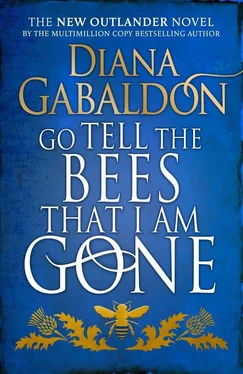



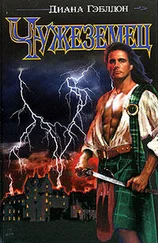
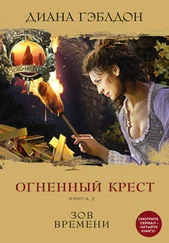
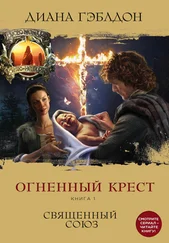
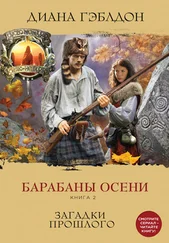
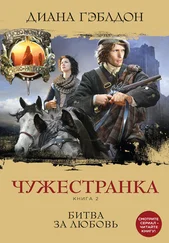
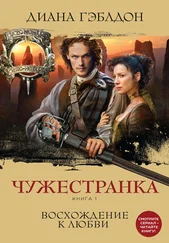
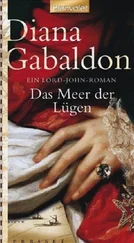
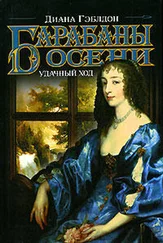

![Диана Гэблдон - Дыхание снега и пепла. Книга 2. Голос будущего [litres]](/books/421947/diana-gebldon-dyhanie-snega-i-pepla-kniga-2-golo-thumb.webp)
